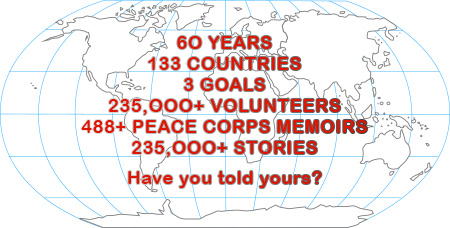A Happy American Birthday — Jamie Kirkpatrick (Tunisia)
by Jamie Kirkpatrick (Tunisia 1970-72)
“How many of you who are going to be doctors are willing to spend your days in Ghana? Technicians or engineers, how many of you are willing to work in the Foreign Service and spend your lives traveling around the world? On your willingness to do that, not merely to serve one year or two years in the service, but on your willingness to contribute part of your life to this country, I think will depend the answer whether a free society can compete. I think it can! And I think Americans are willing to contribute. But the effort must be far greater than we have ever made in the past.”
— John F. Kennedy
A few days ago, a good friend of mine quietly celebrated its 58th birthday. I know the possessive pronoun in that sentence sounds a bit strange, but I do count the Peace Corps as a friend — a good friend, a friend I keep close to my heart. As for its birthday, President John F. Kennedy signed Executive Order 10924 establishing the Peace Corps on March 1, 1961, but the story really begins several months before . . ..
October 14, 1960: it’s less than a month before the election and Democrat John F. Kennedy is running hard. And late. It’s 2 o’clock in the morning and the press corps has gone to bed — it has been a long day on the campaign trail and nothing more is likely to occur, but 10,000 University of Michigan students have been waiting for hours in the cold to see the young candidate and JFK, hoarse from a day of speeches, does not want to disappoint them. So before retiring for the night, he makes a few impromptu remarks on the steps of the Student Union Building and asks a simple question: “How many of you would be willing to serve your country and the cause of peace by living and working in the developing world?” Their reaction is immediately boisterous. An idea is born.
In the summer of 1970, two months after graduating from college, I joined the Peace Corps. I had been expecting to go to Kenya where I had spent the summer of 1968, but when the recruiter called, she asked if I was interested in going to Tunisia. “Where?” I asked. “Tunisia,” she said. “Why? I asked. “Because you speak French.” I quickly looked at a map. “OK!” I said.
I joined a group that included sixteen other Volunteers comprised of coaches who would help develop Tunisia’s national swimming, basketball, and track-and-field programs in anticipation of the 1972 Olympic Games, and teachers who would be either teaching English as a foreign language to adults or kindergarten in Tunisia’s progressive pre-school program. We spent our first six weeks of training in the United States (including ten days of individual homestays in rural West Virginia to introduce us to crossing cultural barriers!) and another six weeks of intensive language training in Tunisia. A few days before Thanksgiving, I arrived in a small town in the mountainous region of the country, not far from the Algerian border, Kasserine. It was the site of a famous World War II battle. I was home.
When Archimedes first fully articulated the principle of the lever, he was reputed to have said, “Give me a place to stand and I will move the Earth.” While I doubt I moved any earth, for the next two years, Kasserine was my place to stand. During my service there I coached the town’s basketball team and taught physical education and English in the local high school. I also traveled throughout the country, learned to speak Arabic, and made friends that have lasted a lifetime. Perhaps most importantly, at the conclusion of my time in Kasserine, I brought a little bit of Tunisia home with me.
I wasn’t finished. I spent a total of six years with the Peace Corps: my two Volunteer years, followed by four more years as a staff member, the first two in Washington where I helped train new groups of Volunteers, and then two more years back in Tunisia as an Associate Country Director. It was during those years that my son was born in Tunisia.
The mission of the Peace Corps is based on fulfilling three goals: to help interested countries in the developing world meet their needs for trained men and women; to promote a better understanding of Americans and to help Americans better understand other people and other cultures. Since its founding in 1961, more than 235,000 Americans have served in a total of 141 countries helping to fulfill this mission. I am a grateful drop in that bucket.
Happy birthday, Peace Corps!
•
Jamie Kirkpatrick is a writer and photographer with homes in Chestertown and Bethesda. His work has appeared in the Washington Post, the Baltimore Sun, the Pittsburgh Post-Gazette, the Philadelphia Inquirer, the Washington College Alumni Magazine, and American Cowboy magazine. A Place to Stand, a book of photographs and essays about Landon School, was published by the Chester River Press in 2015. A collection of his essays titled Musing Right Along was published in May 2017; the second volume of Musings entitled I’ll Be Right Back was released in June 2018. Jamie’s website is www.musingjamie.com

No comments yet.
Add your comment